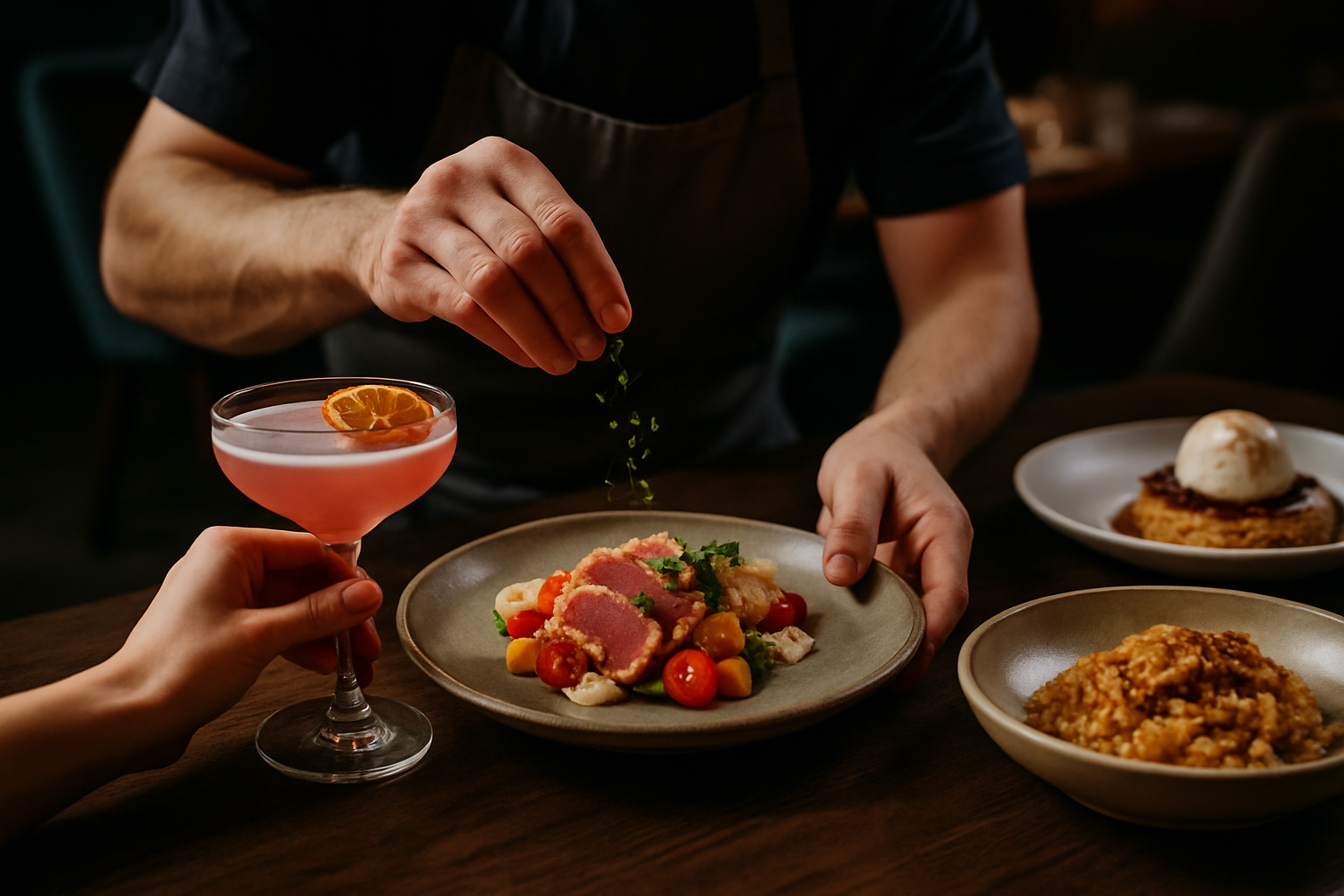Elevating Events: Understanding High-End Catering Services
Discover a variety of premium catering options designed to suit different tastes and occasions. From thoughtfully prepared menus to flexible service styles, these choices offer practical ways to elevate your event while keeping planning simple and enjoyable for everyone involved.

Professional catering services represent the cornerstone of successful events, offering specialized culinary expertise that transforms ordinary gatherings into extraordinary experiences. Whether for weddings, corporate functions, or milestone celebrations, quality catering provides not just food, but a comprehensive hospitality experience that reflects the host’s vision and enhances guests’ enjoyment. Today’s catering industry encompasses diverse specializations, from intimate dinner parties to large-scale galas, with professionals who understand how to balance culinary excellence with impeccable service and seamless logistics.
What Defines High-End Wedding Catering Services?
High-end wedding catering transcends standard food service by offering a personalized culinary journey that complements the couple’s vision for their special day. These premium services typically begin with extensive consultations where caterers work closely with couples to understand their preferences, dietary requirements, and desired atmosphere. The resulting menus often feature signature dishes created specifically for the wedding, incorporating seasonal ingredients and artistic presentation that serves as both sustenance and décor.
Premium wedding caterers distinguish themselves through attention to detail that extends beyond food preparation. Their services typically include professional serving staff trained in formal dining protocols, custom menu design and printing, and coordination with other vendors to ensure seamless timing throughout the reception. Many high-end caterers also provide comprehensive beverage services, including custom cocktail creation, wine pairing recommendations, and professional bartending staff who can create signature drinks reflecting the couple’s story or theme.
The visual presentation becomes particularly important in high-end wedding catering, with elaborate food displays, interactive stations, and carefully choreographed service becoming integral parts of the event design. Leading caterers often collaborate with event designers to ensure food presentation complements the overall aesthetic, from color palettes to serving vessels that enhance the dining experience while reinforcing the wedding’s visual identity.
How to Select Professional Catering for Special Occasions
Selecting the right professional caterer for special occasions requires careful evaluation of several key factors. Begin by assessing the caterer’s experience with events similar to yours in both size and style. Established caterers should readily provide references from past clients and venues, along with portfolios showcasing their work. These resources offer valuable insights into their reliability, creativity, and ability to execute under pressure.
Tastings represent a critical step in the selection process, allowing clients to evaluate not just flavor profiles but presentation standards and attention to detail. Professional caterers should accommodate tastings with flexibility regarding menu customization and dietary accommodations. During these sessions, assess how receptive they are to feedback and how effectively they communicate their culinary vision while respecting your preferences.
Beyond food quality, evaluate the caterer’s operational capabilities including staffing ratios, equipment resources, and contingency planning. Professional caterers should provide transparent proposals detailing all costs including food, beverages, staffing, rentals, and any additional fees. Their contracts should clearly outline payment schedules, cancellation policies, and responsibility for permits or insurance requirements, demonstrating their professionalism and business acumen alongside their culinary expertise.
What Makes Exclusive Party Catering Services Stand Out?
Exclusive party catering services distinguish themselves through personalization that goes beyond standard menu offerings. These premium providers typically offer extensive customization options, creating bespoke menus that reflect the host’s personality, the event’s theme, or cultural significance. The exclusivity often extends to signature dishes unavailable elsewhere, created specifically for the client and sometimes incorporating family recipes or meaningful ingredients that tell a story through food.
The service model for exclusive catering prioritizes guest experience through higher staff-to-guest ratios, ensuring attentive service throughout the event. These caterers typically employ specialized personnel including sommelier-trained beverage directors, pastry chefs for custom dessert creations, and service captains who orchestrate the dining experience with precision. Many exclusive caterers also incorporate theatrical elements such as tableside preparations, molecular gastronomy techniques, or synchronized service that transforms dining into entertainment.
Behind the scenes, exclusive party caterers maintain rigorous quality standards through sourcing practices that prioritize exceptional ingredients, often working directly with specialty producers, artisanal food crafters, and organic farms. Their commitment to excellence extends to comprehensive event management capabilities, often offering services beyond food preparation such as venue selection assistance, entertainment coordination, and overall event design to ensure a cohesive, memorable experience that reflects the host’s vision and standards.
Understanding Catering Service Tiers and Pricing Structures
Catering services typically organize their offerings into distinct service tiers, each providing different levels of customization, service style, and culinary complexity. Entry-level packages often feature buffet or family-style service with standardized menu options, while mid-range offerings introduce plated service, enhanced presentation, and greater menu flexibility. Premium tiers typically feature multi-course plated dinners with wine pairings, custom menu development, and elevated service standards including higher staff-to-guest ratios.
Pricing structures in professional catering reflect numerous variables beyond simple food costs. Labor represents a significant component, including not just service staff but the culinary team’s preparation time, which increases substantially with complex or custom menus. Equipment and rental needs, particularly for venues without kitchen facilities, add considerable costs including transportation, setup, and breakdown fees. Seasonality affects both ingredient availability and pricing, with off-season requests often commanding premium prices.
The table below provides general pricing estimates for different catering service levels based on industry standards:
| Service Tier | Average Cost Per Person | What’s Typically Included | Best For |
|---|---|---|---|
| Standard Service | $75-125 | Buffet or family-style service, standard menu options, basic service staff | Casual corporate events, large gatherings |
| Mid-Range Service | $125-175 | Plated service options, customizable menus, enhanced presentation, full service staff | Upscale social events, milestone celebrations |
| Premium Service | $175-250+ | Custom menu development, multiple courses, premium ingredients, chef interaction, enhanced service ratio | Luxury weddings, high-profile corporate events |
| Ultra-Luxury | $250-500+ | Completely bespoke experience, celebrity chef involvement, specialized equipment, elaborate presentations | Celebrity events, exclusive galas |
Prices, rates, or cost estimates mentioned in this article are based on the latest available information but may change over time. Independent research is advised before making financial decisions.
How Catering Services Enhance Event Management
Professional catering services contribute significantly to overall event management by providing expertise that extends beyond food preparation. Experienced caterers bring valuable insights regarding space utilization, guest flow, and timing considerations that impact the event’s success. They often collaborate with event planners to develop service schedules that complement programming elements, ensuring food service enhances rather than disrupts the event’s momentum.
Logistical coordination represents another valuable contribution caterers make to event management. Professional catering teams handle complex operational details including delivery scheduling, equipment setup, and coordinating with venue staff regarding power requirements, space allocation, and facility usage guidelines. Many full-service caterers also manage rental items including tables, chairs, linens, and place settings, providing comprehensive solutions that simplify the planning process for clients.
Risk management constitutes an often-overlooked benefit professional caterers bring to events. Established catering companies maintain proper licensing, health department certifications, and liability insurance that protect clients from potential legal issues. They implement strict food safety protocols including temperature monitoring, proper storage procedures, and staff training that minimize health risks. Additionally, experienced caterers develop contingency plans for various scenarios from weather disruptions to equipment failures, ensuring service continuity regardless of unexpected challenges.
Sustainable Practices in Modern Catering Services
Sustainability has become increasingly important in modern catering operations, with leading companies implementing eco-conscious practices throughout their operations. Ingredient sourcing represents a primary focus, with many caterers developing relationships with local farmers and producers to reduce transportation impacts while supporting regional food systems. Seasonal menu planning further enhances sustainability by utilizing ingredients at peak availability, reducing the environmental costs associated with out-of-season products while typically improving flavor and reducing food costs.
Waste reduction initiatives have transformed operational practices within progressive catering companies. Many implement comprehensive recycling and composting programs, train staff in portion control techniques that minimize food waste, and develop creative approaches to repurposing unused ingredients. Some caterers partner with food recovery organizations to donate appropriate leftover food to community organizations, turning potential waste into community benefit while reducing landfill impact.
The sustainability focus extends to equipment and service items, with many caterers investing in reusable transport containers, energy-efficient appliances, and biodegradable or compostable service items when disposables are necessary. Client education has become another component of sustainable catering, with companies offering guidance on right-sizing food quantities, selecting environmentally responsible menu options, and implementing zero-waste service approaches that align with clients’ environmental values while maintaining the quality and presentation standards expected from professional catering services.




